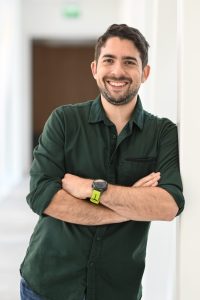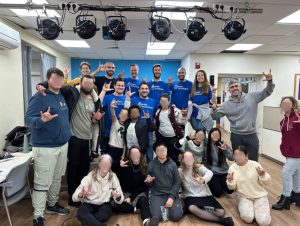Never Give Up
"From a young age, I decided that my hearing impairment would not dictate the course of my life"
Currently an engineer in the R&D department at Biosense Webster, Alon Barash is someone who never gives up on his dreams. Despite being born with a hearing impairment, he recently completed his undergraduate degree in Electrical Engineering and Computer Science at the Viterbi Faculty of Electrical and Computer Engineering, and is pursuing a second degree in the same field.
In addition to the usual challenges that accompany adolescence, military service, and education, Alon’s first challenge in life was learning to hear. “Hearing problems cause you to miss a lot of information and limit your scope of opportunities. As a person who cannot hear, you have to make a significant effort to grasp what others simply perceive. This is a limitation that has accompanied me at every stage of life and continues to challenge me in various areas – academic, social, and more. But at a young age, I decided that my hearing impairment would not dictate the course of my life.” Alon was born in Holon; at school he participated in the “Nachshon” leadership course. Later, he volunteered in the IDF and after completing his service, began a preparatory program that paved the way for his studies at the Technion. During his studies, Alon was introduced to cochlear implant technology, which allows hearing-impaired individuals to hear. During his undergraduate degree, he underwent surgery for a cochlear implant. He recalls, “After a long and difficult period of training and adaptation, there was a significant improvement in my hearing. Before the implant, I could only hear in one ear, which always required me to think about where I stood in relation to the person talking to me. Now I don’t have to think about it because the implant added another ear, a bionic ear, and that’s a huge change, even if it doesn’t replace a normal ear.”
During his degree in electrical engineering, Alon learned about signal processing. His personal story prompted him to explore the world of hearing impairments. At the end of his degree, he started a special project on spatial hearing research under the guidance of Prof. Yossi Atias and Nimrod Peleg, in a collaboration between the Technion and the University of Haifa. Through this research, Alon understood more about the challenges faced by people who have had hearing impairments since childhood. “I continued to act out of a desire to normalize the experiences of hearing-impaired individuals so they could integrate into society without the difficulties that I experienced.” While the company where Alon works, Biosense Webster, is not involved in the field of hearing devices, it does strive to improve people’s quality of life. The company focuses on three-dimensional mapping of the heart for the treatment of arrhythmias. Alon continues to bridge the technological world of electrical and computer engineering with the medical field.
In addition to his professional pursuits, Alon participated in the BrainTech hackathon at the Technion, with a project related to improving the lives of deaf people. He and his team (Ron Liraz, Gal Brown, Aviv Burshtein, Gal Baron and Ezra Ozery) developed an interactive game for learning sign language, based on a depth-sensing camera that identifies the user’s hand movements. The project won first place in the hackathon. Alon explains that with this game, people without hearing impairments can learn how to communicate with those who have hearing impairments more effectively and positively. “Despite the difficulties that come with a hearing impairment, I believe it also generates a mental resilience that allows people to succeed, even in challenging situations. If someone had told me that volunteering for the army or going to the Technion would be too hard for me – I wouldn’t have listened to them.”
According to Alon, family support played a decisive role. “A deaf or hearing-impaired child needs more assistance to bridge the linguistic gap and integrate. With the help of intensive treatment with a speech therapist and a lot of hearing exercises, I managed to integrate into regular education instead of special education. Fortunately, at the Technion, I received significant support from the Unit for the Advancement of Students. Dalia Peled, Sigal Blum, and Gil Berkovich helped me with various aspects. I would also like to thank Danit Cohen from the faculty for her help. In general, I think that since I started studying here, the Technion has improved significantly in assisting students in need. I can also say that I learned a lot of things I didn’t know before about accessibility.” Alon explains that in addition to the importance of tailored organizational support, the students’ collaboration is also required. “They are the ones determining what happens on the ground. The faculty can allocate reserved places for people with disabilities, but these places might be taken by regular students. Such situations taught me that I have to be always proactive. I turned to the faculty and the Unit for the Advancement of Students, emphasizing my and others’ special needs, and I didn’t give up. I used to think that I wanted to receive the same treatment as everyone else, but I learned to accept that due to my impairment, I need a different approach.
In recent months, Alon has volunteered for several initiatives: providing online lessons for students through “Lema’an Hatalmidim,” (For the Students) participating in “Leaders of Hope – Intel’s Maker Group,” delivering packages to soldiers, and more. Accessibility is a vast and complex world, and as Alon mentioned before, even those with disabilities do not understand it enough. “Social awareness of people’s limitations is like a muscle that requires training, or a flame that should not be extinguished. People live their lives and are not always attentive to the needs of others, especially those with disabilities. For this reason, one must know how to ask and remind people. In the end, I see myself not as an advocate of rights but as a regular student who doesn’t let his impairment define him, and I hope that other disabled students will feel the same.”
In conclusion, he summarizes, “My message is that anyone aspiring to overcome their limitations needs to deeply understand their boundaries, remember that it’s okay to ask for help, and that it’s possible to succeed just like anyone else.”




